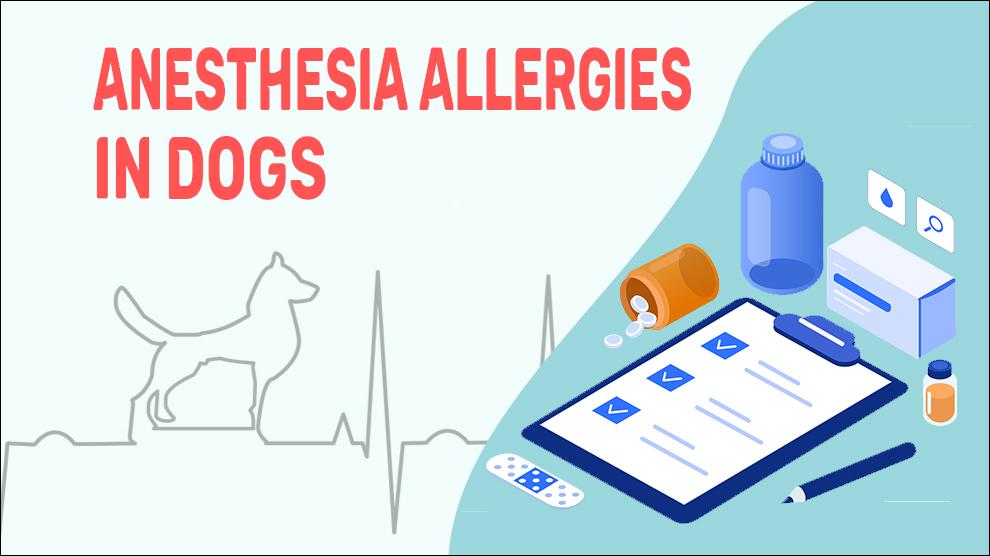What Is Anesthesia Allergies In Dogs?
Certain veterinary procedures such as surgery often require anesthesia. Coined from the Greek word 'aesthesis' meaning “no sensation”, anesthesia means the administration of drugs that decreases sensation and pain in all or particular areas of the body. The veterinarian will give drugs for procedures that require general anesthesia to cut down the nervous system enough to bring on a lack of consciousness. Certain minor procedures require local anesthesia techniques to numb a specific area of the body.
Both the anesthetic procedures allow the veterinarian to execute invasive procedures that need a high level of accuracy. General anesthetic procedures are the most commonly used procedure in dogs and other small animals.
Most of the time, anesthetic procedures are performed with no untoward incidents; however, the risk of adverse reactions when using an anesthetic agent cannot be ignored, whether it is for general anesthesia lasting several hours or for interim sedation. With few studies suggesting that the rate of anesthesia death in pets is higher than in humans, around 0.25 % (1 in 400 animals) experience some type of painful post-anesthetic reaction.
In general, Almost 1 in 1 lakh dogs will have some type of fatal complications to anesthetic agents. These effects may range from a mild decrease in cardiac output, and small swelling at the site of injection to full-scale, severe anaphylaxis, or even death. Though, many vets point out that the risk of death due to anesthesia is relatively lesser than the risk of driving to the clinic to have the treatment that requires anesthesia.
Symptoms Of Anesthesia Allergies In Dogs
Treatment Options For Anesthesia Allergies In Dogs
When your dog exhibits allergic reaction symptoms under anesthesia, the veterinarian will perform intravenous administration of appropriate drugs.
Cetirizine, Loratadine, Benadryl, Loratadine, or another antihistamine can be given for mild reactions.
Corticosteroids (cortisone or prednisone, prednisolone, or methylprednisolone) can also help to reduce swelling and inflammation and keep airways open.
Anaphylactic reactions: Epinephrine, atropine, and/or aminophylline.
Other security measures include emergency treatments to maintain heart function may be provided in life-threatening situations.
Additional fluids and an IV catheter also may be required during the surgery. This helps to restore lost fluids, and make sure that the veterinarian can provide proper drugs efficiently.
Home Remedies For Anesthesia Allergies In Dogs
- Provide all medication and administer environmental changes as recommended by your veterinarian.
- Stop the “triggers” of anesthesia allergy (such as limiting exercise, avoiding exciting or traumatic situations).
- Avoid medications that worsen symptoms of allergy.
Home Remedies For Anesthesia Allergies In Dogs
Complete physical tests and pre-operation exams will help to make out conditions that might cause adverse reactions under anesthesia, such as organ disease, infectious diseases, or dehydration.
It’s critical to find out these disorders as they could cause complications. Chronic conditions, like heart problems or diabetes, should also be declared in case they are not caught in the pre-surgery check-up.
Most chronic conditions can enhance the chances of an anesthetic allergic reaction being fatal.
Previous allergy episodes, whether they were to medications, a vaccine, or even anesthesia drugs should be mentioned.
Affected Dog Breeds Of Anesthesia Allergies
Greyhound, Brachycephalic Dog Breeds, Toy Dog Breeds
Causes And Diagnosis For Anesthesia Allergies In Dogs
1. Causes:
- Improper monitoring/dosing.
- No proper assessment of Prior medical conditions.
- Older dogs/puppies are more prone to complications.
- Brachycephalic breeds: During anesthesia, the facial structure of these breeds can increase the chance of airway obstruction and respiratory problems.
- Sighthounds and Giant breeds – They metabolize drugs differently than other breeds and may take longer to recover from anesthesia. Dosage for giant breeds should be calculated based on their lean body mass.
- Herding breeds – genetic mutation in these breeds predisposed them to accumulate drugs in the brain.
- Toy breeds – doses should be carefully calculated, even a small mistake will have a more drastic effect.
- Doberman Pinscher – Dogs having Von Willebrand disease means a tendency to dilated cardiomyopathy and issues with blood clotting; it’s better to check the veterinarian to examine your dog before it undergoes anesthesia.
2. Mortality:
There is mortality associated with ‘anesthesia’, however, it is comparatively very rare.
3. Diagnosis:
- Complete blood count test (CBC)
- Complete physical exam
- X-rays and Ultrasound
- Electrocardiogram
- MRI or CT scan
4. Prognosis:
The rate of anesthesia allergy in dogs is rare, however, it does happen and in some cases, it can be deadly. Implementation of proper precautions will decrease the risk of complications with anesthesia.
When To See A Vet For Anesthesia Allergies In Dogs?
- Swelling/redness at the injection site
- Drop in pulse/ blood pressure
- Rashes/hives/itchy skin
Food Suggestions For Anesthesia Allergies In Dogs
- Vitamins: Broccoli, Brussel sprouts, spinach, kale, papaya, strawberries, and pineapple.
- Organ meat, Grass-Fed Meat, boiled chicken.
- Chicken soup bone broth (or use lamb/beef bones).
- Green vegetables: Cauliflower, cabbage, cantaloupe, Brussel sprouts, spinach, Kale, and silver beets.
- Beef liver, Mutton Liver, lean meats, raw egg yolk, canned sardines, salmon, pumpkin, and green vegetables.
Conclusion
Although the anesthesia allergy is rare, it is better to get recommendations from a veterinary anesthesiologist. Check if they have any other neurological or metabolic problems before proceeding with surgeries requiring anesthesia.

















